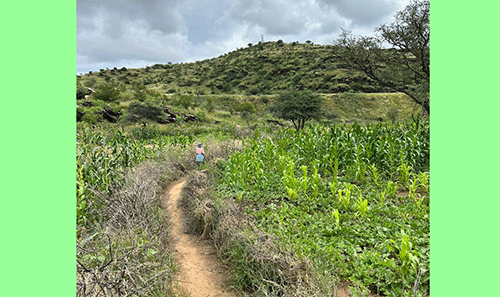Paulus Kiiyala Shiku
The love of a mother knows no bounds – even when their own lives are at stake.
This adage is especially true for a group of mothers, who left the comfort of their homes in northern Namibia to do just that – eke out a living for their children at any cost in the capital.
The group has devised an unconventional approach to tackle poverty and joblessness.
These women grow their own food along one of the country’s major highways on the edge of Windhoek.
In the complete vastness along the B1 road, they have found their existence.
Not only are they and their crops exposed to nature’s elements, such as the recent pouring rain or the occasional scorching heat, but their produce is out in the open.
This means they must stand guard over it at all times.
They are forced by harsh living conditions, making it a survival of the fittest situation in the bustling streets and alleys of the city with no welcome sign – as some would put it.
The group had to take the unconventional route.
Their struggle dates back as far as 2002 when they first came to Windhoek with the hope of securing jobs, living a better life, or sending their children to school.
Without qualifications, jobs are hard to find.
This is how these women ended up in the informal settlements of Havana and Okahandja Park.
Initially, the groups started off cutting and selling grass along the highway – just a stone’s throw away from the Nampower Van Eck power station.
Refusing to give up, some decided to take advantage of the good rains and land in Brakwater to grow maize, melons, pumpkins, beans and ground nuts.
Speaking to New Era yesterday, Aino Amutenya (48) said they were chased away from Brakwater a few years ago for invading municipal land and turning it into maize fields.
“The City Police officers told us we cannot cultivate there. We can only do that back home in Owambo or Kavango,” she narrated.
Amutenya said after they were told to abandon their fields in Brakwater, they turned to harvesting grass to sell as fodder along the B1 highway.
She said as hardworking mothers who were raised to produce food from the land, they could not just sit and let their family die of hunger.
When the rain started in November, they once again cleared spaces next to the mountains near the Lafrenz township, and sowed seeds.
“It is poverty that makes us do this.
We have children to feed, clothe and send to school. We saw that there is good rain and land here, so we took the chance and started cultivating. As you can see, we have food that we cannot afford to buy if we didn’t do this,” Amutenya told New Era while weeding her beans.
They have occupied close to two hectares of land, which now looks like a typical village in the northern parts of Namibia.
Amutenya has five children, all of whom depend on her, especially the young ones between ages eight and 15.
With the beans, mutete, corn and melons from their plots, these women can sell and make a little profit to buy basics such as bathing soap and sugar.
When they harvest, they have enough free food for their children.
Maria Ndara (51), was resting in a makeshift shade in the centre of her plot when New Era approached her.
Their plots are fenced off with camel thorn branches to keep thieves out.
She said she is taking care of her produce because other residents who are not cultivating have started stealing from their fields.
Ndara said they now wake up as early as 05h00 to come to the fields to work, and guard until around 19h00 when they must return to their shelters.
It is a daily routine if they want to keep their produce safe until harvest.
“I decided to come work here, regardless of whose land it is, because I want to do my part in feeding our children,” she maintained.
Ndara’s husband works as a guard.
She said his salary is not enough for the whole family.
“So, with this, I can sell and also just take some home to cook. That way, I have done my part and assisted my husband to take care of our children,” she added.
She said they will continue every year to cultivate and feed their families because they do not have other ways to get food.
“The government does assist us with Harambee food, but not all of us get it. Sometimes people do not give us food because they see we have things to sell, so they think we are better off. This is not fair,” Ndara statrd.
Flugencia Luminga (49), was not sure who the journalist was. Hence, she was hesitant to get close to this reporter.
However, she gathered courage when she saw others speaking.
“We are looking for food. It is nothing else but poverty that brought us here. We have kindergarten and school fees to pay,” she said softly.
Luminga added that the whole process of sowing weeding and seeing the plants grow is challenging in the mountains, compared to the flat land back in Kavango.
“It’s tough. We started sowing in November, but the seeds did not germinate, maybe because of pests. In December and January, it is the same challenge. We didn’t give up in February. We planted again – and this time, they came out and the rain is good. We are happy,” she beamed.
They expect their bumper harvest, especially of maize and melons, by the end of May.
The maize stalks and anything else which is left do not go to waste, as it is bundled up and sold to farmers as animal fodder.


